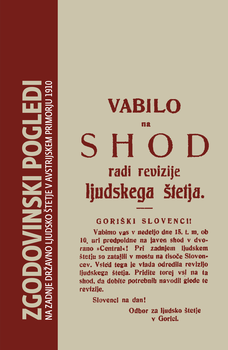Zgodovinski pogledi na zadnje državno ljudsko štetje v Avstrijskem primorju 1910. Jezik, narodnost, meja
The Habsburg Monarchy carried out its first modern official population census in 1857. Since 1869, censuses were conducted every ten years with the critical date of 31 December. The censuses took into account the present population. From 1880 onwards, they also included a section on everyday language/language of communication, on the basis of which it was thenceforth possible to determine the national structure of the population in the country, even though the question thusly formulated did not yield accurate results. It was especially before the census of 1910 that the Slovenes and other Slavic nations in the monarchy demanded the elimination of the section on everyday language (lingua d'uso, Umgangssprache) and the introduction of a new section on nationality or mother tongue. The last Austrian population census of 1910 is a characteristic and important event from the political history of the Slovenes in the Austrian Littoral: characteristic because of the conduct of city authorities carrying out the census, and important because it represented a political victory of the Slavic population, after the established inaccuracies forced the authorities to order a revision of the census. Both the Yugoslav and Italian sides used the census of 1910 as evidence in setting their territorial claims during the peace negotiations after the First and Second World Wars.
Downloads

Series
License

This work is licensed under a Creative Commons Attribution-NonCommercial-NoDerivatives 4.0 International License.
